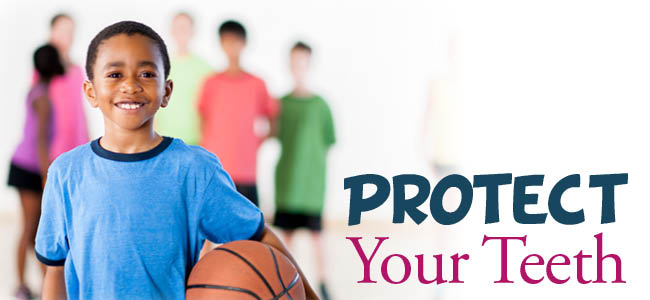By admin
02 Mar, 2016
Dental Emergency, Dental Health, Dental Tips, General Dentistry, General Health, Lifestyle, Preventive Dental Care
broken tooth, dental emergency, dental injury, dental trauma, knocked out teeth, mouthguards

The madness of March is right around the corner, and 68 NCAA Division I basketball teams will go head to head over the course of three weeks to determine the national champion — and you know what that means: excitement, upsets, and kids and adults alike heading out to have fun on the courts themselves.
Getting involved in any athletic activity is a great way to stay fit and healthy. Whether you are 8 or 58, sports offer an excellent form of active entertainment and exercise, but they also pose a threat to your oral health.
What the Stats Say
According to a new study*, playing sports comes with the heightened risk of dental and orofacial injuries:
- Each year more than 5 million teeth are knocked out of their sockets as a result of trauma.
- Basketball, football, hockey, martial arts, and boxing have the highest tooth-injury risk.
- Soft-tissue lacerations are the most common mouth and face injuries that occur during sports activities.
- Dental trauma can include tooth fracture, tooth loss, or injury resulting in a loose tooth.
Protect Your Teeth with a Mouthguard
The added risk to your dental health doesn’t mean you or your loved ones should shy away from playing sports. There are protective measures you can take to dramatically reduce the chances of damaging your teeth. The American Academy of Pediatric Dentistry (AAPD) recommends a mouthguard for all children and youth participating in any organized sports activities, including the following:
- Acrobatics
- Basketball
- Boxing
- Extreme
- Rugby
- Skateboarding
- Soccer
This recommendation is suitable for adults as well. In fact, according to the ADA, sports mouthguards have been shown to reduce the risk of sports-related dental injuries. Statistics show* that the overall rate of an orofacial injury is 1.6 to 1.9 times higher when a mouthguard is not worn. And while basketball and baseball are two sports in which dental and facial trauma are relatively common, participants rarely wear protection. Fortunately, famous athletes like Stephen Curry and LeBron James are great examples of athletes who are rocking mouthguards and killing it on the court.
So before you test your skills on the court, consider the example they have set. Having a dental provider fit you with a mouthguard that is resilient, comfortable, and durable could mean the difference between keeping or losing your teeth in a sports-related incident.
To find out more about mouthguards, call your Lancaster dental office at (661) 952-7865 to talk to a provider today!
*Young, E., Macias, R., Stephens, L. Common Dental Injury Management in Athletes. Sports Health: A Multidisciplinary Approach. 2013;20(10):1-6.
More
By admin
24 Aug, 2015
Dental Emergency, Dental Tips, General Dentistry, General Health, Lifestyle, Preventive Dental Care
anxiety, broken tooth, chipped tooth, cracked tooth, lost tooth, nutrition, oral hygiene, plaque, smoking, stress, tooth decay, tooth loss, tooth trauma
It’s a beautiful summer day outside. You are walking through a park when, out of nowhere, a levitating bowl full of giant pinwheel lollipops appears in front of you. You reach for a particularly colorful one and take a huge chomp out of it. Suddenly, clouds fill the sky and shards of the lollipop fall from your mouth. You look down only to realize it’s your teeth that have all fallen to the ground instead!
Sound like a familiar nightmare? Bad dreams about tooth loss are not uncommon, and neither is the fear of losing your teeth as you age. While it can happen, tooth loss isn’t inevitable. There are certain avoidable conditions that lead to it, and if tooth loss does occur, there are some amazing solutions — like dental implants — that can restore your natural-looking smile to its original state.
Are You at Risk for Tooth Loss?
Tooth loss is not a natural occurrence. The following are some common circumstances that most often lead to the loss of a tooth or teeth.
Tooth trauma: One of the most common causes of tooth loss is trauma caused by impact or unexpected contact with a hard surface. Breaking, chipping, and cracking that leads to a tooth needing to be removed can be caused by a fall, getting hit with a bat or ball while playing sports, or biting down on a hard object, like a hidden seed or shell.
The use of teeth as a tool is another example of how trauma can lead to a tooth extraction. Avoid activities like removing caps, tearing tags, and cutting threads with your teeth. There are tools that are made for these types of jobs, so you can avoid damaging your teeth.
Disease: Poor oral hygiene and nutrition cause the buildup of plaque and tooth decay that leads to periodontal disease. Preserving your teeth means more than just brushing twice a day and flossing; it means taking care of your whole health. You need to maintain a balanced diet, moderate or eliminate activities like drinking alcoholic beverages, and get to those routine dental visits. Periodontal disease doesn’t just put you at risk for tooth loss — it puts your whole health at risk.
Stress and anxiety: Stress and anxiety are detrimental to many aspects of your health, including your teeth. It can cause you to clench your jaw and grind your teeth during the day, as well as in your sleep. There are many stress-relief techniques such as breathing exercises, yoga, and meditation that can help. You should also talk to your dental provider about being evaluated for a bite guard to protect you from nighttime clenching and grinding.
Smoking: Everyone knows that smoking is bad for your lungs and your heart, but people don’t realize that it also increases the likelihood of tooth loss. It affects the blood supply to your gums and increases the occurrence and severity of periodontal disease. The risks of tooth loss increase with both traditional and smokeless cigarettes.
The bottom line is that the key to keeping your teeth throughout your lifetime is taking care of your whole health. If tooth loss does occur, don’t despair: Your provider has solutions available that can restore your smile. From tooth implants to a variety of denture options, there is a natural-looking option perfect for you.
To find out more about how to maintain your natural smile, call the office of Dr. Doug Weber today at (661) 952-7865.
More
By admin
04 Mar, 2015
Dental Emergency, Dental Tips, General Dentistry, Orthodontics
broken braces, broken crown, broken tooth, cracked tooth, dental emergency, lost crown, lost tooth
This time of year the weather shifts to longer, warmer, and brighter days, allowing families that have been in hibernation to begin enjoying some of their favorite outdoor activities again. From hiking and biking to actively engaging in sports like baseball and soccer, the fun factor is high — and so is the opportunity for dental disasters.
There are many ways to protect your and your children’s teeth while enjoying the active side of life. Mouthguards and helmets are a must, but even with the best precautions in place, that unexpected spill from a bike or a missed footstep on the trail can quickly lead to a dental emergency. While you can’t predict when a dental emergency will happen, the following tips will help you navigate everything from a broken tooth to damaged orthodontics, so that you can get back to enjoying your springtime fun in no time at all.
Knocked-Out Tooth: Rinse the tooth carefully, making sure not to wash away any remaining tissue. Attempt to place the tooth back in its socket carefully. If this is not possible, place it in a container of milk or water with a pinch of table salt. Call Lancaster emergency dentist Dr. Douglas Weber immediately. Your tooth has the best chance of being saved if you are seen within an hour of having it knocked out.
Chipped, Cracked, or Broken Tooth: Gather and rinse all broken pieces of the tooth. Rinse your mouth with warm water, and apply gauze if there is bleeding. Use a cold compress to relieve pain and swelling in the injured area, and contact your emergency dentist Dr. Weber about being seen immediately.
Partially Dislodged Tooth: When a tooth gets pushed out of its proper position, it is important to manage the pain and get into your emergency dentist immediately. Apply a cold compress to the area, and take a pain reliever such as Tylenol or Advil as needed.
Lost or Broken Crown: Save your crown and set up an appointment with your Lancaster emergency dentist Dr. Douglas Weber right away. If possible, use over-the-counter dental cement to reattach the crown. If there is any pain, take an over-the-counter pain reliever such as Advil or Tylenol. Clove oil can also be used to soothe sensitive areas.
Broken Braces: Orthodontic wax can be used to cover or temporarily reattach loose brackets and broken wires. If a broken wire is poking out and into your cheek or tongue, use the eraser end of a pencil to move it into a comfortable position, then cover it with wax, gauze, or cotton. See your orthodontist to have your braces repaired.
Preparing for Dental Emergencies
Now that you know how best to react to preserve your smile in the worst-case scenarios, here are a few items to have on hand:
- Dentist’s phone number and email address
- Small, portable container for dental emergency kit
- Saline solution
- Tissue
- Gauze
- Orthodontic wax
- Dental cement
- Compress
- Ibuprofen and/or Tylenol
For more information on how to handle a specific dental emergency, or for immediate help, contact Lancaster emergency dentist Dr. Doug Weber at (661) 952-7865.
More
If you are currently undergoing chemotherapy, we know that you are already in extreme discomfort. What patients may not realize is how these strong drugs can effect the area of concern as well as the rest of your body, including the mouth area. Chemotherapy drugs kill cancer cells, but also affect normal cells, including cells in the mouth. Healthy cells can generally repair the damage caused by the chemotherapy however, some side effects can still exist. The problems depend on the chemotherapy drugs and how your body reacts to them. You may have these problems only during treatment or for a short time after treatment ends.
It’s important to know that side effects in the mouth can be serious.
- The side effects can hurt and make it hard to eat, talk, and swallow.
- You are more likely to get an infection, which can be dangerous when you are receiving cancer treatment.
- If the side effects are bad, you may not be able to keep up with your cancer treatment. Your Physician may need to cut back on your cancer treatment or may even stop it.
What mouth problems does chemotherapy cause?
- Soreness and ulceration of the mouth
- Mouth infections
- Dry mouth
- Bleeding gums
- Burning, peeling, or swelling tongue
- Change in taste
Why Should I See Dr. Weber?
Schedule an appointment with Dr. Weber in Lancaster, CA before chemotherapy begins to inorder to help prevent potentially serious mouth problems. Dr. Weber can help you get your teeth and gums into the healthiest possible condition before your treatment begins.
During your chemotherapy treatment you may experience dry mouth therefore there will be less saliva to protect the teeth. Fluoride toothpaste or a fluoride mouthwash during your chemotherapy will help protect your teeth and can be prescribed by Dr. Weber.
Discuss with your oncologist any dental work that needs to be done during your chemotherapy treatment. There will be times during your chemotherapy when you will be at more risk of bleeding and infection, and the timing of any dental work needs to be planned very carefully. Speak with your oncologist about ideal timing for dental procedures. Dr. Weber would be happy to help you communicate with your physician as well. Schedule an appointment with Dr. Weber as soon as you can before chemotherapy treatments begin or at any time during your treatments if you are experiencing discomfort.
What Will the Lancaster, CA Dental Team at Douglas B. Weber, D.D.S. Do?
- Check and clean your teeth
- Take x-rays
- Take care of mouth problems
- Show you how to take care of your mouth to prevent side effects
Additional Resources:
http://www.macmillan.org.uk/Cancerinformation/Livingwithandaftercancer/Symptomssideeffects/Mouthcare/Chemotherapy.aspx
More
 Anytime you have a toothache, the first thing most people do is seek an over-the-counter (OTC) pain reliever. While this may provide some temporary relief, to discover the cause of your toothache and the right treatment, you will need to see a dentist. Dr. Weber in Lancaster, CA will determine the exact cause of your pain in order to prescribe the best treatment plan for you. Dr. Weber will determine if the problem is due to decay or trauma to a tooth involving the central pulp tissue containing the nerve which is the most common cause for severe toothaches. This will require endodontic (“endo” = inside, “dont” = tooth) treatment or what is commonly referred to as a root canal treatment, which will remove the pain and allow you to keep the tooth.
Anytime you have a toothache, the first thing most people do is seek an over-the-counter (OTC) pain reliever. While this may provide some temporary relief, to discover the cause of your toothache and the right treatment, you will need to see a dentist. Dr. Weber in Lancaster, CA will determine the exact cause of your pain in order to prescribe the best treatment plan for you. Dr. Weber will determine if the problem is due to decay or trauma to a tooth involving the central pulp tissue containing the nerve which is the most common cause for severe toothaches. This will require endodontic (“endo” = inside, “dont” = tooth) treatment or what is commonly referred to as a root canal treatment, which will remove the pain and allow you to keep the tooth.
Just make sure you don’t let a toothache go untreated too long, you want to pinpoint the problem before it gets worse. If you are unsure of what you are feeling, contact the dental team at Douglas B. Weber D.D.S. in Lancaster, CA as soon as possible so you can get back to enjoy a pain-free life.
More




